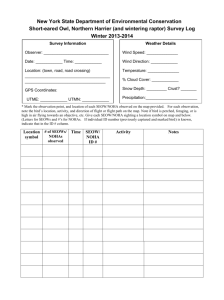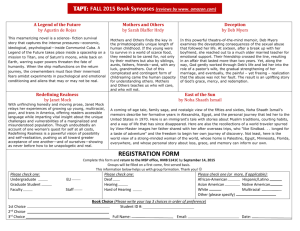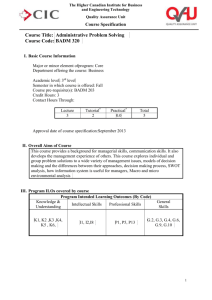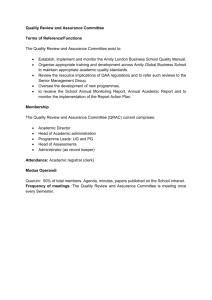3. Dr Noha El Torky
advertisement
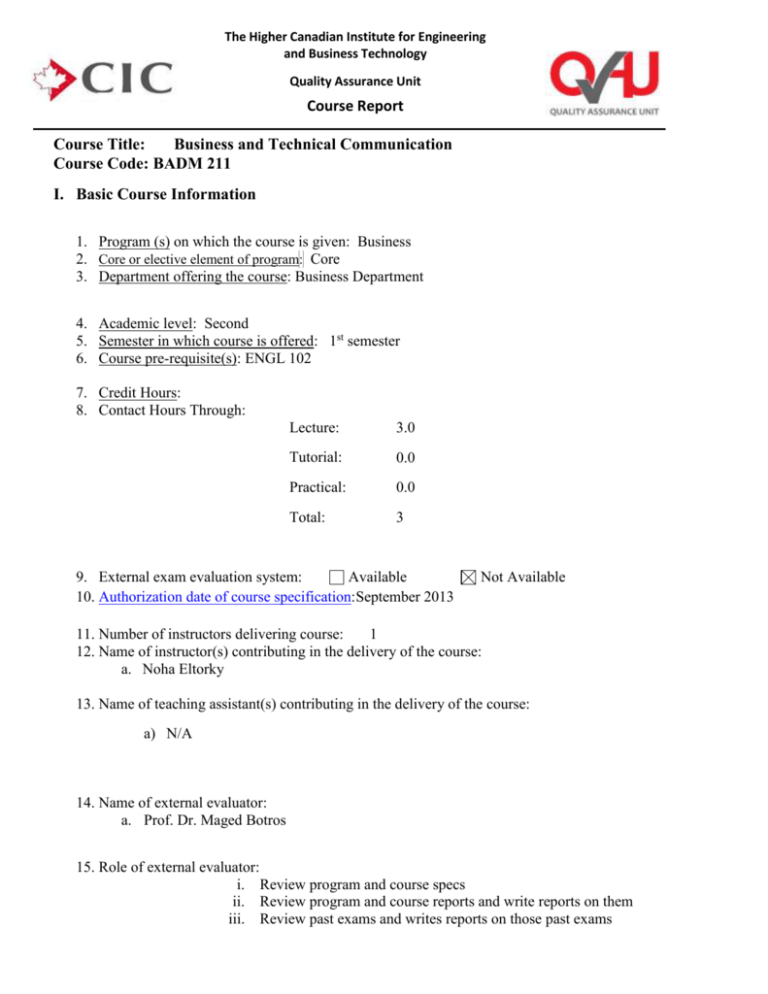
The Higher Canadian Institute for Engineering and Business Technology Quality Assurance Unit Course Report Course Title: Business and Technical Communication Course Code: BADM 211 I. Basic Course Information 1. Program (s) on which the course is given: Business 2. Core or elective element of program: Core 3. Department offering the course: Business Department 4. Academic level: Second 5. Semester in which course is offered: 1st semester 6. Course pre-requisite(s): ENGL 102 7. Credit Hours: 8. Contact Hours Through: Lecture: 3.0 Tutorial: 0.0 Practical: 0.0 Total: 3 9. External exam evaluation system: Available 10. Authorization date of course specification: September 2013 Not Available 11. Number of instructors delivering course: 1 12. Name of instructor(s) contributing in the delivery of the course: a. Noha Eltorky 13. Name of teaching assistant(s) contributing in the delivery of the course: a) N/A 14. Name of external evaluator: a. Prof. Dr. Maged Botros 15. Role of external evaluator: i. Review program and course specs ii. Review program and course reports and write reports on them iii. Review past exams and writes reports on those past exams The Higher Canadian Institute for Engineering and Business Technology Quality Assurance Unit Course Report II- Professional Information 1. Statistics Number of students registered in course: 44 Students completing the course (i.e., attending the final exam): Number 44 Percentage 100 % Results Pass/Fail Status Status Number Percentage Passed 42 95.45 % Failed 2 4.55 % Total 44 100% Number Grading of Students A+ A A- B+ B C+ C D+ D D- F 3 7 5 5 6 5 2 3 2 2 4 Percentage 6.8% 4.54% 9.09% 15.90% 11.36% 11.36% 13.635 11.36% 4.54% 6.81% 4.45% Number Percentage Excellent Very Good Good Pass Fail 9 12 11 10 2 20.43% 27.26% 24.99% 22.71% 4.45% The Higher Canadian Institute for Engineering and Business Technology Quality Assurance Unit Course Report 2. Course Teaching: a. Topics Taught – From those specified in the Course Specification Topics Actually Taught 1- 2- 3- 4- 5- 6- What is technical writing? Communication Channels The importance of technical communication The importance of teamwork Diverse teams…Dispersed teams Conflict resolution in collaborative projects What is technical writing? Communication Channels The importance of technical communication The importance of teamwork Diverse teams…Dispersed teams Conflict resolution in collaborative projects Achieving clarity in technical communication Simplifying words, sentenced, and paragraph for conciseness Organizing technical communication Achieving clarity in technical communication Simplifying words, sentenced, and paragraph for conciseness Organizing technical communication Audience recognition Defining terms for audiences How to communicate to different audience levels Avoid Biased language Guidelines for effective multicultural communication Audience Involvement Audience recognition Defining terms for audiences How to communicate to different Weeks Lecturer(s) 1 Noha Eltorky 1 Noha Eltorky 1 Noha Eltorky 1 Noha Eltorky 1 Noha Eltorky 1 Noha Eltorky The Higher Canadian Institute for Engineering and Business Technology Quality Assurance Unit Course Report Topics Actually Taught 7- 8- 9- 10 audience levels Avoid Biased language Guidelines for effective multicultural communication Audience Involvement Audience recognition Defining terms for audiences How to communicate to different audience levels Avoid Biased language Guidelines for effective multicultural communication Audience Involvement Audience recognition Defining terms for audiences How to communicate to different audience levels Avoid Biased language Guidelines for effective multicultural communication Audience Involvement The importance of memos, letters, emails, instant messages and text messages Which communication channel should you use? The difference among routine communication channels Memos Letters Criteria for different types of letters The writing process at work The importance of memos, letters, emails, instant messages and text messages Which communication channel should you use? The difference among routine communication channels Memos Letters Criteria for different types of letters The writing process at work Weeks Lecturer(s) 2 Noha Eltorky 2 Noha Eltorky 1 Noha Eltorky 1 Noha El Torky The Higher Canadian Institute for Engineering and Business Technology Quality Assurance Unit Course Report b. Topics taught as a percentage of those specified in the course specification: > 85% 60 – 84% < 60% c. Topics covered in the exams as a percentage of those taught: > 85% 60 – 84% < 60% d. Topics Not Covered – From those specified in the Course Specification Reasons for not teaching topics Not Covered Topics 12345e. Extra Topics Covered – Not specified in the Course Specification Topics Covered Not in the course specification) 12345- Weeks Reasons for including these topics The Higher Canadian Institute for Engineering and Business Technology Quality Assurance Unit Course Report f. Teaching and Learning Methods Used Teaching/Learning Method Lectures & Seminars Tutorials Computer-lab Sessions Practical lab work Reading Materials Web-site Searches Research & Reporting Problem Solving / Problem-based Learning Projects Independent Work Group Work Case Studies Presentations Simulation Analysis Others (Specify): The Higher Canadian Institute for Engineering and Business Technology Quality Assurance Unit Course Report g. Student Assessment Assessment Method Percentage of Total (i.e. Marks) Schedule Midterm Exams 20 % 7 Final Exam 50% 15 Quizzes 20% 3,5 Course Work/Assignments 10 % Report Writing Case Study Analysis Oral Presentations Practical Group Project Individual Project Others (Specify): Total 100% h. Members of examination committee: 1. Dr Mohey Hadhoud 2. Dr Dina Krema 3. Dr Noha El Torky 3. Facilities and Teaching Materials a. List of References: Totally adequate (Up to Date) Adequate to some extent Inadequate b. Teaching Aids: Totally adequate Adequate to some extent Inadequate 15 The Higher Canadian Institute for Engineering and Business Technology Quality Assurance Unit Course Report c. Raw Materials and Equipment: Totally adequate Adequate to some extent Inadequate 4. Administrative Constraints: List any inadequacies: 5. Student Evaluation of the Course Students evaluating the course: 36 Number 44 Evaluation Category Overall Course Evaluation Course Material Instructor Course Management System (CMS) Teaching Assistant Average Weight (out of 5) 4.28 4.28 4.58 4.20 N/A 6. Suggestions for Course Improvements The least grade was given to the updates on the CMS (course management system) which needs more follow up week by week after each lecture 7. Comments from External Evaluator(s) – (If available) 8. Progress on actions completed as identified in the previous year’s action plan: Actions 1. There was no recommended actions in last year course report 9. Progress on actions not completed as identified in the previous year’s action plan: The Higher Canadian Institute for Engineering and Business Technology Quality Assurance Unit Course Report Actions Reasons 1. There was no recommended actions in last year course report 10. Action Plan for developing/improving this course in the coming academic year Actions Completion Date The CMS website should be updated more frequently as the students feedback in the students evaluation Fall 2014 Course coordinator: Dr. Noha Eltorky Person Responsible The course professor Signature The report was discussed and approved in the Department Council held on Head of Department Signature: Date: January 2014 Date:
